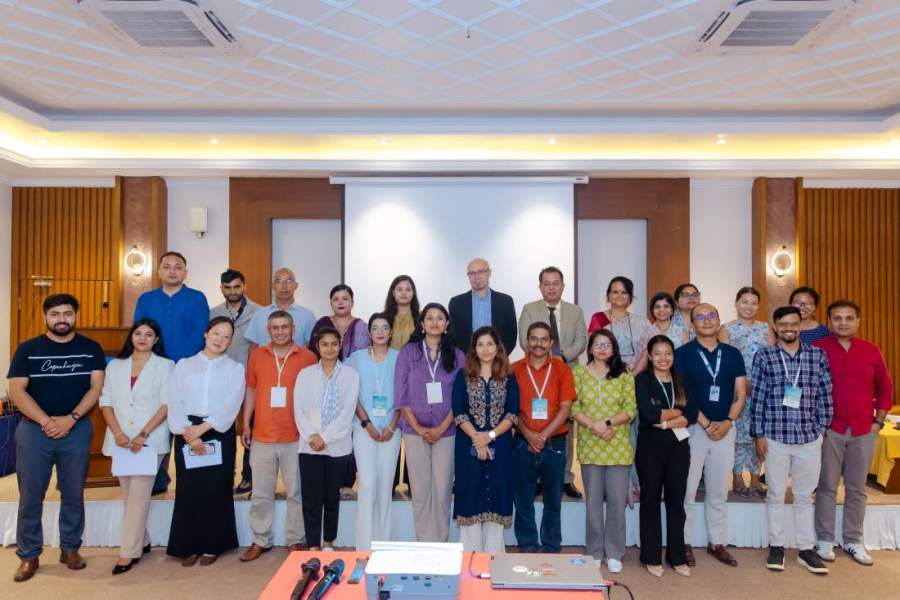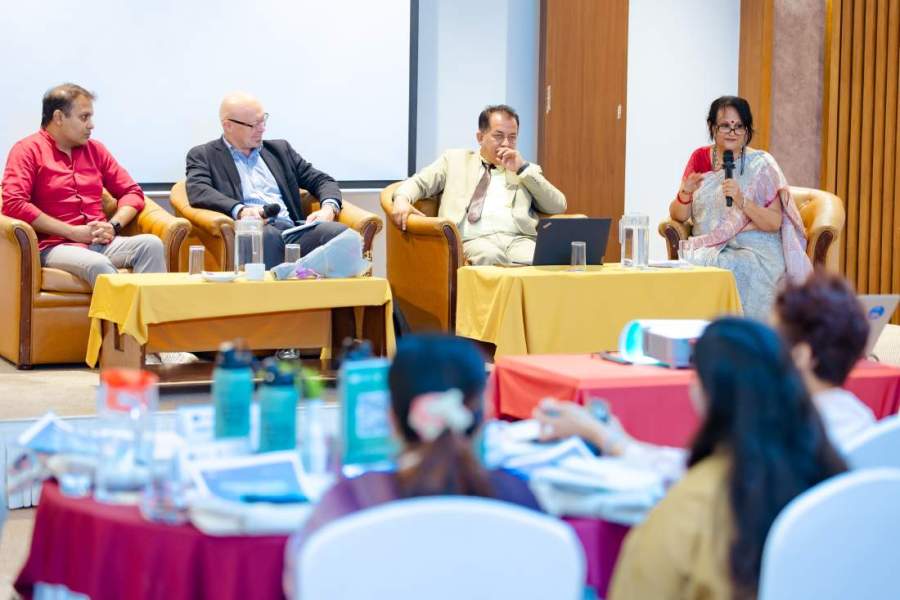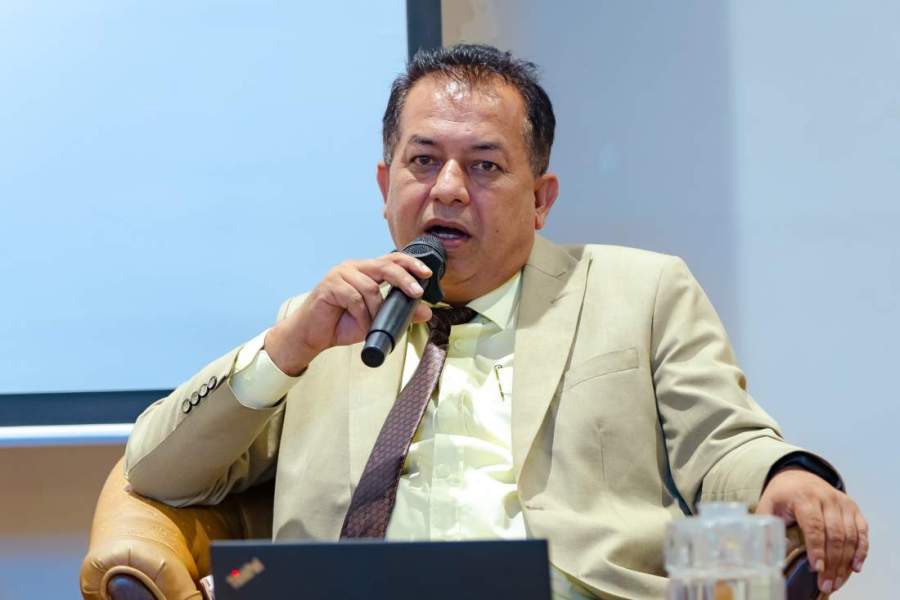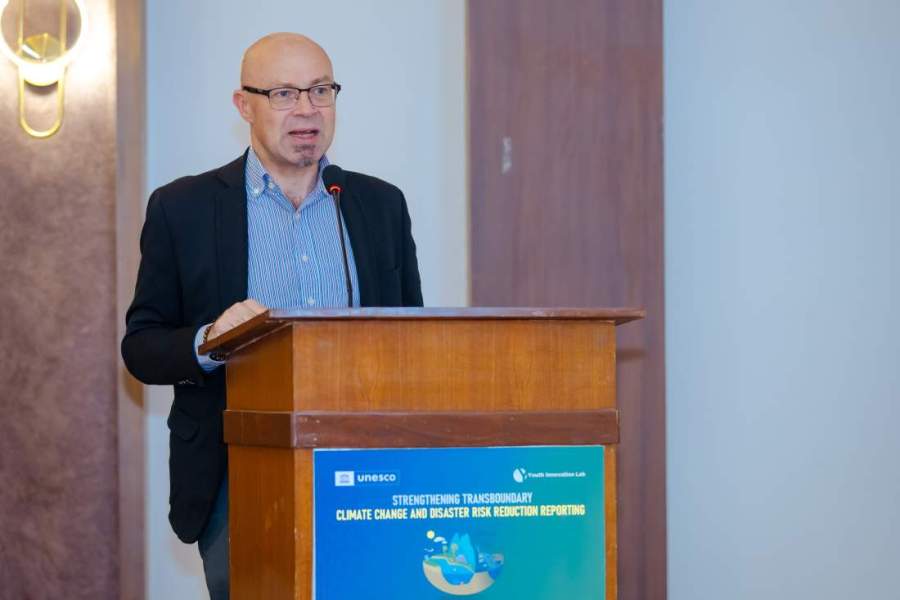

Kathmandu, 27 June 2025 — A four-day regional workshop titled “Strengthening Transboundary Climate Change and Disaster Risk Reduction (DRR) Reporting in the Nepal-India Context” concluded today in Kathmandu, equipping media professionals from Nepal and India with critical tools, digital skills, and collaborative strategies to advance climate and disaster reporting across the Hindu Kush Himalaya (HKH) region. Organized by Youth Innovation Lab (YI-Lab) in collaboration with UNESCO Nepal, the initiative brought together 20 journalists, 15 from Nepal and 5 from India, to enhance their capacity to report on shared transboundary climate risks due to Glacial Lake Outburst Floods (GLOFs), unsustainable resource extraction, extreme weather events, and climate-induced disasters. The workshop placed strong emphasis on AI-assisted journalism, data-driven storytelling, fact-checking, cross-border collaboration in
reporting, and the ethical responsibilities of media in shaping public awareness and policy discourse.
During the inaugural session, chief guest of the event, Dinesh Prasad Bhatt, Chief Executive of the National Disaster Risk Reduction and Management Authority (NDRRMA), said, “Stronger coordination and cooperation between Nepal and India is essential to address transboundary climate and disaster challenges. He also expressed his personal commitment to support this effort in every way he can. On the occasion, Jaco Du Toit, UNESCO Representative to Nepal, underscored the media’s critical role in promoting climate resilience: “Joint media initiatives can bridge information gaps, influence disaster policy, and foster accountability around unsustainable practices like sand mining.”

Welcoming the participants, Santosh Chhetri, Board of Director at YI-Lab, highlighted the deep connections between Nepal and India, not just through culture, friendship, and borders, but also through shared rivers and ecosystems. He called for timely sharing of information and data related to climate change and disaster risks between the two countries.
The workshop opened with a high-level panel discussion — “Stories Sans Borders: Strengthening Media Collaboration in Addressing Climate Change and Disaster Risks in the Nepal-India Context” moderated by Namrata Sharma of Nepal National Commission for UNESCO, featuring panelists including Bhatt, Du Toit, and Alok Gupta, a senior Indian environment journalist. The panel discussion highlighted a shared commitment among participants to collaborate at both professional and personal levels in promoting
transboundary climate change and DRR issues between Nepal and India. It emphasized the urgent need for joint media action to address cross-border environmental risks and explored both the challenges and opportunities in advancing collaborative climate reporting across the region.

The four-day-long workshop provided an intensive blend of expert-led sessions and hands-on training. Dr. Basanta Raj Adhikari highlighted the techniques for “Communicating Climate Science with Clarity,” followed by Neera Shrestha Pradhan of ICIMOD on “Transboundary Climate Risks in the Hindu Kush Himalaya” Journalists sharpened their ability to counter misinformation through a session on “Tackling
Disinformation in DRR and Climate Change” and gained frontline perspectives in “Experience Sharing from the Ground” with youth climate advocate Tashi Lhazom of Nepal and Chandrani Sinha of India. Sessions by Santosh Chhetri on “Reader-Centric Climate Storytelling” and Kanak Mani Dixit, a senior journalist, on “Diplomacy, Treaties, and Cross-Border Journalism” deepened ethical and narrative approaches. Similarly, Dr. Reshma Shrestha of Kathmandu University introduced “Geospatial Tools
for Climate Journalism,” while the “Data Story Lab” with Prayon Joshi, a GIS engineer, enabled participants to apply data-driven storytelling techniques. AI tools were explored in the session of Alok Khatri of NAAMI on “AI for DRR Reporting,” complemented by Goma Karki and Sabin Dotel of YI-Lab on “Disaster Information Management System (DIMS) for Informed Decision-Making.” Multimedia skills were enhanced through Rajneesh Bhandari’s session on “Resilience Storytelling,” while Hari Karki, a humanitarian expert, and Chhetri guided participants in “Joint Media Action Planning” to foster ongoing cross-border collaboration in climate reporting.
The participating journalists from Nepal and India expressed that the collaborative discussion across borders provided a much-needed platform to address the often- overlooked transboundary dimensions of climate change and disaster risk in the Nepal–India context. Journalists from both countries recognized that shared challenges, such as GLOFs, sand mining, and erratic weather patterns, require shared narratives. They found the sessions on AI-assisted journalism, GIS mapping, and cross-border story pitching especially relevant, equipping them with actionable skills and ideas to apply in their own newsrooms. Several participants emphasized that the workshoprevealed critical information gaps and reporting blind spots that can only be addressed through continued cooperation.

The formation of cross-border reporting teams during the workshop was seen as a concrete step forward, with participants committing to jointly producing in-depth stories that reflect the interconnected realities of the HKH. They also pledged to continue their collaborations with more institutional support and regular engagement to ensure that the voices and stories from this vulnerable region help shape regional climate discourse and policy.
On the final day, participants presented their collaborative story pitches, received constructive feedback from peers, facilitators and experts, and committed to advance these stories in their newsrooms post-workshop. In the context of rising transboundary climate risks and increasing public demand for
reliable information, this initiative offered journalists the vital skills, digital tools as GIS, AI tools, and various other local data sourcing tools from Nepal, India and global and new cross-border networks to help them inform public understanding, advocate for resilient communities, and influence policy through evidence-based climate journalism. More about the bootcamp, https://youthinnovationlab.org/bootcamps/strengthening- transboundary-climate-change-and-dis
Immediate Contact
Rohit Dahal
Program Coordinator, Youth Innovation Lab
Email: [email protected] | Phone: +977 9802344220
Rabin Rai
Communications Officer, UNESCO Nepal
Email: [email protected] | Phone: +977
Comment